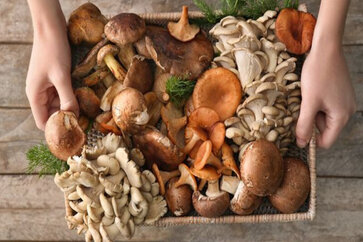Ayurvedic Medicine For Gastric Problem
Gastritis refers to the inflammation or irritation of the inner lining of the stomach, known as the mucosa. It is a common condition that can be caused by various factors. The symptoms typically include pain or discomfort in the upper abdomen, also referred to as dyspepsia. 
Gastritis can manifest in different forms, such as acute gastritis, which is a sudden and short-term illness, chronic gastritis, which is a prolonged condition, or as a result of another underlying medical condition.
In Ayurveda, gastritis is referred to as “Urdhavaga Amalapitta.” It predominantly affects individuals with a pitta constitution. When individuals with a pitta dosha experience an imbalance in their constitution, they are more prone to developing gastritis-related issues.
What Is The Most Common Cause Of Acute Gastritis?
Acute gastritis can be caused by various factors. Some common causes include:
1. Infections: Bacterial or viral infections, such as Helicobacter pylori (H. pylori) or the norovirus, can lead to acute gastritis.
2. Medications: Certain medications like nonsteroidal anti-inflammatory drugs (NSAIDs), such as aspirin or ibuprofen, can irritate the stomach lining and cause acute gastritis. Additionally, corticosteroids, certain antibiotics, and other medications may also contribute to gastritis.
3. Excessive alcohol consumption: Consuming excessive amounts of alcohol can irritate and inflame the stomach lining, leading to acute gastritis.
4. Stress: Severe stress or traumatic events can trigger acute gastritis in some individuals.
5. Autoimmune disorders: In rare cases, autoimmune disorders, where the immune system mistakenly attacks healthy stomach cells, can cause acute gastritis.
6. Chemical ingestion: Swallowing or consuming corrosive substances, such as strong acids or alkalis, can result in acute gastritis.
7. Severe illness or injury: Serious medical conditions, major surgeries, severe burns, or traumatic injuries can contribute to the development of acute gastritis.
Note: It’s important to note that these are general causes, and the specific cause of acute gastritis may vary from person to person.
If you suspect you have acute gastritis, it is recommended to consult a healthcare professional for an accurate diagnosis and appropriate treatment.
Ayurvedic Herbs For Gastric Problems
1. Sandalwood (Santalum album): Sandalwood possesses cooling properties that can help reduce gastritis problems by relieving inflammation in the stomach muscles.
2. Indian gooseberry (Emblica officinalis): Indian gooseberry, also known as Amla, is highly beneficial in treating various stomach ailments, including gastritis. It can help alleviate symptoms like dyspepsia, burning sensation, anorexia, vomiting, and bleeding.
3. Rhubarb (Rheum emodi): Rhubarb has mild anti-inflammatory properties and is used to treat gastritis problems in children. It can also help reduce stomach acidity.
4. Asparagus (Asparagus racemosa): Asparagus is known for its antispasmodic properties, which help reduce heat in the stomach. The root of the plant is particularly effective in reducing hyper-acidity in the digestive system.
5. Ginger (Zingiber officinale): Ginger extract is effective in treating acid dyspepsia associated with gastritis. It is especially useful for individuals who consume non-vegetarian food regularly.
6. Bitter Chamomile (Matricaria chamomilla): Bitter chamomile tea can provide relief from gastritis caused by tension and worries.
7. Cardamom (Elettaria cardamomum): Cardamom has soothing effects on the stomach and is particularly beneficial for gastritis that causes heartburn.
8. Fennel (Foeniculum vulgare): Fennel is traditionally used in India as a digestive agent. Chewing fennel seeds after meals can soothe the stomach, aid digestion, reduce flatulence, and relieve excess acidity.
9. Licorice (Glycyrrhiza glabra): Licorice root can help alleviate inflammation and damage to the stomach. It is also known to reduce the proliferation of Helicobacter pylori, a bacterium associated with gastritis.
Note: These Ayurvedic herbs offer natural remedies for gastric problems, but it’s important to consult with a healthcare professional or Ayurvedic practitioner for appropriate usage, dosage, and any potential interactions with existing medications or health conditions.
Diet Plan For Gastritis Patients
An appropriate diet plays a crucial role in the treatment of gastritis. A well-balanced and nutritious diet can help prevent gastritis and alleviate unpleasant symptoms. When creating a diet plan for individuals with gastritis, the following tips should be taken into consideration:
1. Consume protein-rich foods: Gastritis patients should include protein-rich foods in their diet to aid in the repair of stomach damage caused by gastritis. However, it is important to choose low-fat sources of protein, as fatty foods can stimulate increased acid production in the stomach, leading to irritation of the stomach lining.
2. Incorporate fruits and vegetables: Gastritis patients should emphasize the consumption of low-acid fruits and cooked vegetables. These foods are rich in vitamin C and flavonoids, which possess antioxidants that help inhibit the growth of harmful bacteria, such as Helicobacter pylori.
3. Avoid spicy and acidic foods: Spicy foods and acidic ingredients can exacerbate gastritis symptoms. It is advisable to avoid or minimize the consumption of spicy foods, citrus fruits, tomatoes, and vinegar, as they can irritate the stomach lining.
4. Opt for whole grains: Whole grains, such as brown rice, whole wheat bread, and oats, are excellent choices for gastritis patients. They provide essential nutrients and fiber without causing irritation to the stomach.
5. Limit caffeine and alcohol: Both caffeine and alcohol can aggravate gastritis symptoms. It is recommended to reduce or eliminate the intake of coffee, tea, carbonated beverages, and alcoholic drinks.
6. Stay hydrated: Drinking an adequate amount of water is important for maintaining proper digestion and preventing dehydration. Gastritis patients should ensure they stay well-hydrated throughout the day.
7. Eat smaller, frequent meals: Instead of consuming large meals, it is beneficial for gastritis patients to opt for smaller, more frequent meals. This helps reduce the burden on the stomach and aids in better digestion.
8. Keep a food diary: It can be helpful to keep a record of the foods consumed and any symptoms experienced. This can assist in identifying trigger foods or patterns that worsen gastritis symptoms.
Remember, it is recommended to consult with a healthcare professional or registered dietitian to create a personalized diet plan that suits the specific needs and tolerances of the individual with gastritis.
Home Remedies For Gastric Problems
1. Consuming a mixture of carom (ajwain) seeds and black salt with hot water provides immediate relief from gas or flatulence.
2. Eating a piece of jaggery (gur) after each meal can help alleviate gas or flatulence.
3. Sitting in an upright posture (vajrasana) for 5 minutes after meals can provide instant and lasting relief from gas or flatulence.
4. Sprinkling fenugreek (methi) seeds or taking fenugreek seeds with salted butter (lassi) can help relieve gas or flatulence.
5. Drinking lemon juice and black pepper (kali mirch) powder with hot water can help overcome gas or flatulence.
6. Boiling a piece of ginger, long pepper (pippali), black pepper (kali mirch) powder, or cumin seeds (jeera) in milk can help alleviate gas or flatulence caused by consuming plain milk.
7. Consuming oranges in the morning helps cleanse the intestines and reduce gas formation. Eating oranges with black salt provides immediate relief from gas or flatulence.
8. Eating radish (mooli) with salt and black pepper (kali mirch) can help overcome gas or flatulence. However, remember that radish aids in digestion but cannot digest itself, so it’s advisable to consume a piece of jaggery or eat radish leaves afterward.
9. Drinking mint (pudina) juice provides instant relief from gas or flatulence.
10. Consuming turmeric and salt with water can also provide immediate relief from gas or flatulence.
11. Eating guava (amrud) with salt every morning can help alleviate gas or flatulence problems.
12. Chewing a piece of ginger before meals improves digestion and reduces gas formation.
13. Regularly using asafoetida (hing), fenugreek (methi), cumin seeds (jeera), ajwain (carom) seeds, garlic, and ginger in cooking can help overcome gas or flatulence problems.
14. Drinking bitter gourd (karela) juice helps overcome the problem of flatulence.
15. Boiling 5-6 cloves (laung) in water and drinking it after cooling helps alleviate gas or flatulence.
16. Applying a paste of asafoetida (hing) on the navel provides instant relief from gas or flatulence.
17. Consuming roasted cumin (jeera) powder with honey after meals helps reduce gas or flatulence problems.
18. Drinking a mixture of lemon juice and black pepper (kali mirch) powder with warm water helps overcome gas or flatulence.
19. Boiling a piece of ginger, long pepper (pippali), black pepper (kali mirch) powder, or cumin seeds (jeera) in milk helps alleviate gas or flatulence caused by regular milk consumption.
20. Drinking cabbage (patta gobi) or carrot juice helps overcome gas or flatulence.
21. Sitting in an upright posture (vajrasana) for 5 minutes after each meal provides immediate and lasting relief from gas or flatulence.
22. Consuming raw garlic regularly or using garlic in cooking helps overcome gas problems.
23. Eating radish (mooli) with salt and black pepper (kali mirch) helps overcome gas or flatulence. Remember that radish aids in digestion but cannot digest itself, so it’s advisable to consume a piece of jaggery or eat radish leaves afterward.
These home remedies can provide relief from gas or flatulence, but it’s important to consult with a healthcare professional if symptoms persist or worsen.























